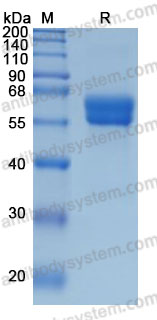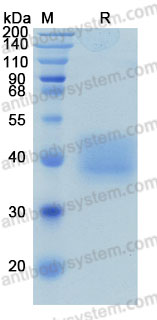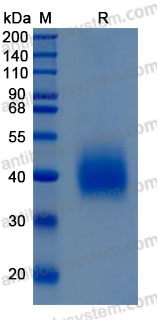Catalog No.
AMC95201
Biological activity
Measured by the ability of the immobilized protein to support the adhesion of the human breast cancer cells (MCF‑7 ). The ED50 for this effect is 0.25-1 μg/mL.
Expression system
Mammalian Cells
Species
Mus musculus (Mouse)
Protein length
Asp157-Val709
Nature
Recombinant
Endotoxin level
<0.1 EU/μg of the protein by the LAL method.
Purity
>90% as determined by SDS-PAGE.
Accession
P09803
Applications
Bioactivity, ELISA, Immunogen, SDS-PAGE, WB
Form
Lyophilized
Storage buffer
Lyophilized from a solution in PBS pH 7.4, 5% Trehalose, 5% Mannitol.
Reconstitution
Reconstitute in sterile water for a stock solution. A copy of datasheet will be provided with the products, please refer to it for details.
Shipping
In general, proteins are provided as lyophilized powder/frozen liquid. They are shipped out with dry ice/blue ice unless customers require otherwise.
Stability and Storage
Use a manual defrost freezer and avoid repeated freeze thaw cycles. Store at 2 to 8°C for one week. Store at -20 to -80°C for twelve months from the date of receipt.
Alternative Names
CD324, Uvomorulin, Epithelial cadherin, E-cadherin, CDHE, CAM 120/80, UVO, CDH1, Cadherin-1
E-cadherin inhibits the proliferation and migration of human colorectal cancer cells through Hippo signaling pathway., PMID:40421484
Lipopolysaccharide induces retention of E-cadherin in the endoplasmic reticulum and promotes hybrid epithelial-to-mesenchymal transition of human embryonic stem cells-derived expandable lung epithelial cells., PMID:40413286
TMBIM1 promotes epithelial mesenchymal transition by accelerating autophagic degradation of E-cadherin in glioblastoma., PMID:40394049
Hereditary diffuse gastric and lobular breast cancer syndrome associated with germline CDH1 variants: focus on lobular breast cancer., PMID:40366456
The Clinical Relevance of Epithelial-to-Mesenchymal Transition Hallmarks: A Cut-Off-Based Approach in Healthy and Cancerous Cell Lines., PMID:40332096
PCSK9 promotes progression of anaplastic thyroid cancer through E-cadherin endocytosis., PMID:40328788
Colonoscopy findings in CDH1 carriers from a multicenter international study., PMID:40323501
Transcription factor BACH1 promotes epithelial-mesenchymal transition by repressing iron metabolism-related genes., PMID:40315568
Association between proband characteristics and CDH1 cascade genetic testing uptake in at-risk relatives., PMID:40305395
The Association of Aquaporins with MAPK Signaling Pathway Unveils Potential Prognostic Biomarkers for Pancreatic Cancer: A Transcriptomics Approach., PMID:40305202
The DNA Methylation is Involved in Liver Cancer Metastasis via Regulation of E- cadherin Gene., PMID:40302090
KRIBB11 Exerts Anticancer Effects on A172 Glioblastoma Cells via the Cdh1/SKP2/p27 and HSF1/p53/p21 Pathways., PMID:40280718
Prognostic Value of <em>SOX9</em>, <em>E-Cadherin</em>, and <em>KLF4</em> Expressions in Clear Cell Renal Carcinoma., PMID:40235245
Advancing the Evaluation and Management of CDH1-Associated Gastric Cancer., PMID:40203872
Micro-proteomics reveals distinct protein profiles and SPARC/FGF2/CDH1 regulation of human Sertoli cells between Sertoli cell-only syndrome and normal men., PMID:40192810
COPD susceptibility gene HHIP regulates repair genes in airway epithelial cells and repair within the epithelial-mesenchymal trophic unit., PMID:40192657
CDH1 genetic variants and its aberrant expression are the risk factors for colorectal cancer metastasis., PMID:40169954
Sustained chromosomal passenger complex activity preserves the pluripotency of human embryonic carcinoma cells., PMID:40136047
CCL2 expression predicts clinical outcomes and regulates E-cadherin and angiogenesis in pituitary tumours., PMID:40063010
Association of XRCC gene family and CDH1 gene polymorphisms with gastric cancer risk in a Chinese population., PMID:40059436
Afadin loss induces breast cancer metastasis through destabilisation of E-cadherin to F-actin linkage., PMID:40026293
Loss of E-cadherin Activates EGFR-MEK/ERK Signaling, Promoting Cervical Cancer Progression., PMID:39993806
Potentiated Effects of Photobiomodulation and Celecoxib on the Epithelial-Mesenchymal Transition Signaling of E-Cadherin, N-Cadherin, α-SMA in Breast Cancer Cells, MCF7, and MDA-MB-231., PMID:39992209
KDM1A Acts as an Oncogene and Facilitates the Epithelial Mesenchymal Transition Process in Gastric Cancer., PMID:39907114
The Oncopromoting Gene RBM6 Inhibits Prostate Tumour Cell Migration During Epithelial-to-Mesenchymal Transition., PMID:39900560
Alpha-linolenic acid-mediated epigenetic reprogramming of cervical cancer cell lines., PMID:39895102
Integrating E-cadherin expression levels with TNM staging for enhanced prognostic prediction in colorectal cancer patients., PMID:39871234
Epithelial mesenchymal transition and cancer stem cell markers in oral epithelial dysplasia and oral squamous cell carcinoma., PMID:39849873
Aberrant E-cadherin Expression in Lobular Carcinoma In Situ: A Comprehensive Immunohistochemical Evaluation of N-terminal, Extracellular, and C-terminal E-cadherin Domains., PMID:39807823
Tyrosine phosphatase SHP2 accelerated ovarian cancer via modulating integrin/ E-Cadherin/ ZEB1 induced EMT., PMID:39789103
The Patterns of P53, E-Cadherin, β-Catenin, CXCR4 and Podoplanin Expression in Oral Squamous Cell Carcinoma Suggests a Hybrid Invasion Model: an Immunohistochemical Study on Tissue Microarrays., PMID:39776043
Adolescents and young adults with germline CDH1 variants and the risk of overtreatment., PMID:39760880
A 3D Computational Study on the Formation and Progression of Tumor Cells in Diffuse Gastric Cancer., PMID:39755811
Invasive lobular carcinoma of the breast: we diagnose it, but do we know what it is?, PMID:39748709
A TAF11 variant contributes to non-syndromic cleft lip only through modulating neural crest cell migration., PMID:39727181
DNA Methylation Pattern and mRNA Expression Level of E-Cadherin and P16 Genes in Thrombotic Disorders., PMID:39711001
Validation of the NCCN/Yale criteria for the identification of CDH1 pathogenic variant carriers., PMID:39674581
Downregulation of lncRNA-MALAT1, Altered Immunohistochemical Expression of Cyclin D1 Protein and E-Cadherin Protein in Correlation to Meningioma Grades., PMID:39611935
The Recurrent E-Cadherin (CDH1) Mutation c.760G>A Causes Orofacial Clefts but Does Not Predispose to Hereditary Cancer., PMID:39596675
The Inhibitory Effect of Hedera helix and Coptidis Rhizome Mixture in the Pathogenesis of Laryngopharyngeal Reflux: Cleavage of E-Cadherin in Acid-Exposed Primary Human Pharyngeal Epithelial Cells., PMID:39596310
FMNL3 Promotes Migration and Invasion of Breast Cancer Cells via Inhibiting Rad23B-Induced Ubiquitination of Twist1., PMID:39582466
Cryo-EM structures of apo-APC/C and APC/CCDH1:EMI1 complexes provide insights into APC/C regulation., PMID:39567505
Six2 regulates the malignant progression and 5-FU resistance of hepatocellular carcinoma through the PI3K/AKT/mTOR pathway and DNMT1/E-cadherin methylation mechanism., PMID:39556430
Linking CDH1 SNPs to gastric cancer risk: a comprehensive analysis of rs16260, rs13689, and rs9929218., PMID:39550749
Comprehensive characterization of invasive mammary carcinoma with lobular features: integrating morphology and E-cadherin immunohistochemistry patterns., PMID:39549221
Lessons learned from 150 total gastrectomies for prevention of cancer., PMID:39547590
MAD2L2 Dimerization Is Not Essential for Mitotic Regulation., PMID:39519037
Exploration and identification of diabetes targets in nursing: CDH1 and DVL1., PMID:39495995
Homologous Targeting Effect of Cancer Cell-Derived Liposomes (Memposomes) Mediated by Cell Adhesion Molecules: Role of E-cadherin., PMID:39456144
E-cadherin/CD34 double immunostaining in placental diagnosis., PMID:39451172




